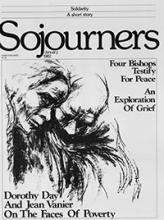"Marginal Notes" is a new column that will appear each month in Sojourners. It will be personal in nature and reflective in spirit. Offering a kind of writing different from editorials and articles, "Marginal Notes" will afford an opportunity for more open-ended and personal communication.
Its subjects will be people, events, stories, community, our spiritual and political lives--all from a perspective that tries to be both biblical and firmly rooted in our present historical situation. The columns will be written from inside Sojourners community, on visits to other communities, on the road, out in the churches, home in the city, in quiet places, amid political struggle. They will come from the margins of my notebook, the margins of America, even the margins of the church.
The title of the column reveals a basic assumption--that things look clearer from the margins, that the biblical insight is usually an outsider's insight, that the church itself is meant to be a marginal society in whatever circumstances it finds itself--marginal because of its loyalty to Jesus Christ.
These columns will be personal perspectives from someone who thinks the best metaphors for the church are the ones of pilgrims, strangers, and sojourners--those who try to sing the Lord's song in a strange land.
To be marginal in one's society is not, emphatically not, to withdraw as some would charge. It is to be motivated and led by values and commitments different from and often contrary to the mainstream. It is to have the capacity of bringing something new and fresh to the public arena.
Read the Full Article

